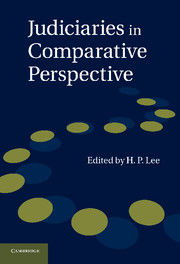Book contents
- Frontmatter
- Contents
- Contributors
- Foreword
- Preface
- Table of cases
- Table of statutes
- Part I
- Part II
- Part III
- Part IV
- Part V
- 20 Judges and non-judicial functions in Australia
- 21 The impact of extra-judicial service on the Canadian judiciary
- 22 Judges and the non-judicial function in New Zealand
- 23 Judges and non-judicial functions in South Africa
- 24 Judges and non-judicial functions in the United Kingdom
- 25 Judges and non-judicial functions in the United States
- Part VI
- Index
- References
23 - Judges and non-judicial functions in South Africa
from Part V
Published online by Cambridge University Press: 07 September 2011
- Frontmatter
- Contents
- Contributors
- Foreword
- Preface
- Table of cases
- Table of statutes
- Part I
- Part II
- Part III
- Part IV
- Part V
- 20 Judges and non-judicial functions in Australia
- 21 The impact of extra-judicial service on the Canadian judiciary
- 22 Judges and the non-judicial function in New Zealand
- 23 Judges and non-judicial functions in South Africa
- 24 Judges and non-judicial functions in the United Kingdom
- 25 Judges and non-judicial functions in the United States
- Part VI
- Index
- References
Summary
The core function of the judiciary in any jurisdiction, it has been suggested, consists in the ‘determination of matters in court by the delivery of judgments enforceable by process of law’. Chapter 8 of the South African Constitution affirms this view by associating ‘judicial’ matters with the business of the courts. Section 165(1) of the Constitution vests the ‘judicial authority of the Republic’ in ‘the courts’, and s. 166 indicates that the ‘judicial system’ consists of the various courts. Tellingly, too, ss. 174 and 175 deal with the appointment of judges and acting judges not in the abstract but as members of particular courts.
Such provisions add colour to the concept of judicial functions, but without necessarily preventing judges from undertaking non-judicial functions in addition to their core activities. South African judges have in fact always performed extraneous functions, and in this country there is a long and notable tradition of depending on judges to chair governmental commissions of inquiry – often, if erroneously, referred to as ‘judicial commissions’.
- Type
- Chapter
- Information
- Judiciaries in Comparative Perspective , pp. 474 - 492Publisher: Cambridge University PressPrint publication year: 2011

